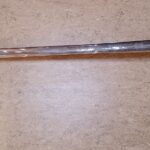
Arthur Burgess was born on June 12th, 1895 and raised in Baine Harbour, Newfoundland. He was the fourth son of James Edward and Lydia Burgess. The family owned a business called Baine Harbour Packing Company.
In 1916, at the age of 21 and caught up in the fervour of the First World War commencing two years earlier, Arthur decided to join the Newfoundland Regiment. Arthur was in the field on several fronts in 1917, including Arras. Over the course of his service during the war, he rose through the ranks from Lance Corporal to Second Lieutenant. Upon the end of the First World War, Burgess was in Officer Training School.
By the time he returned home at the end of the First World War, most of his family was dead except his sister, Laura. He eventually married Gertrude DeWolfe, despite the friction caused by their different faiths (he was of the Church of England, Gertrude’s family were strict Catholics).
Arthur served in the “Vet’s Guard” during the Second World War. He had various detachments to look after prisoners of war sent back to Canada for internment. At these camps, Arthur was Officer Commanding. He was eventually sent on special assignment which saw him loaned to 21 Army Group (a British element under the command of General Montgomery).
He was placed in charge of the coal mines in Belgium upon its liberation. Arthur worked to defend these places from German counterattack. He was involved in the liberation of Holland. His work in Belgium saw him taken from 21 Army Group in 1945 and placed with the American 9th Army. Arthur’s job was to take over all German coal mines and associated industries once captured and get the mines producing as soon as possible.
During this time, Arthur arrested Alfried Krupp von Bohlen und Halbach (often referred to as Alfried Krupp) who was later charged with war crimes for using slave labor from concentration camps at his family’s steelwork company, Fried. Krupp. Started by Friedrich Krupp, it expanded to “become one of the most important industrial enterprises of the nineteenth century”*. During the Second World War, it was a key weapons and material supplier to the German Government. Arthur Burgess also set up his headquarters in the Krupp mansion in Essen, Villa Hugel, and took control of the Krupp factories. The mansion was originally built by Alfried’s predecessor, Alfred Krupp, between 1870-1873.
Arthur Burgess was discharged from the Canadian Military in May 1946 when he accepted a contract with the Coal Commission for Germany as Chief Controller of Production. He retired from the army as a Colonel.
During his service, Arthur received the following medals and decorations:
- British War Medal
- Victory Medal
- 1939-1945 Star
- France & Germany Star
- Defence medal
- Canadian Volunteer Service Medal & Clasp
- General Service Medal
- Order of the Crown of Belgium
Come visit the Royal Newfoundland Regiment Museum to see Burgess’ Funeral Pall and Dog Tags.
*Villa Huegel https://www.villahuegel.de/en/historie/



No comment yet, add your voice below!